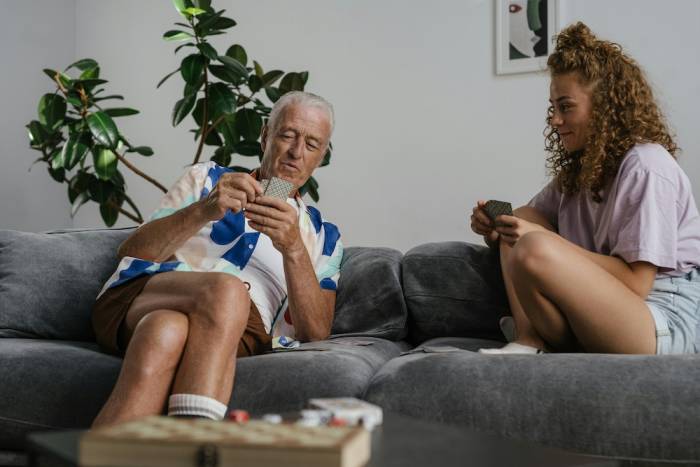First-Time Buyer’s Guide
Your Complete Guide to Buying Your First Home
Buying your first home is a huge milestone. It’s exciting, but it’s normal to feel nervous or overwhelmed by the process.
At Laurus, we believe your solicitor shouldn’t just handle the legal work. They should make the entire experience straightforward and reassuring.
Don’t worry if you come across any terms you don’t recognise in this guide. We’ve tried to keep it as free of legal jargon as possible, but towards the end you’ll find a handy glossary that explains any legal terms in plain English.
We’ve also included a Frequently Asked Questions section with answers to as many questions about buying your first home as we could think of. If you can’t find the answer you need here, please don’t hesitate to call our team on 020 3146 6300 or email us at hello@lauruslaw.co.uk. We’re always here to help.
Setting Yourself Up for Success
Buying your first property is a team effort. You’ll deal with estate agents, the seller’s solicitor, your mortgage lender or broker, and a surveyor. It can seem complicated, but your solicitor is the one who ties it all together.
At Laurus, we see ourselves as the glue that holds your buying team together. We’ll help coordinate everyone, keep you updated, and make sure everything is ready on time. We act as one team with you at the centre.

A Word from Farah Syed, Head of Residential Property
“Buying your first home should be exciting, not overwhelming. My team and I know how many questions first-time buyers have, and we see it as our job to answer them all clearly, honestly and kindly. We work hard to make sure you understand what you’re buying, feel supported at every stage, and have someone in your corner protecting your interests throughout. That’s what good conveyancing should be.”
Your Complete Guide to Buying Your First Home


1. Getting Ready to Buy
Before you start house-hunting, it helps to know what you can afford.
- Check your savings – including deposit, legal fees, surveys and moving costs.
- Speak to a mortgage broker or lender – they can help you understand your budget.
- Get an Agreement in Principle (AIP) – this is a lender’s early indication of what they’re likely to lend you. It shows sellers you’re a serious buyer.
- 💡 Tip: Don’t forget extras like Stamp Duty (if applicable), mortgage fees, or insurance. Planning ahead saves stress later.


2. Finding the Right Property
Once you’ve found a place you love, you’ll make an offer through the estate agent. If the seller accepts, it’s “subject to contract” meaning you’re not legally bound yet.
Check:
- What’s included in the sale (fixtures, fittings, appliances).
- Whether any renovations you want will need permission.
We’re happy to talk through anything you’re not sure about.


3. Instructing Your Solicitor
Many first-time buyers aren’t sure what happens once they choose a solicitor. Here’s exactly what to expect when you instruct us at Laurus and how you can be ready to make things run smoothly.
- Verifying Your Identity – Solicitors are required by law to confirm who you are before we can act for you. At Laurus, we use secure online ID checks that you can complete on your smartphone or computer.
- Putting Us in Touch with Your Estate Agent – We’ll ask you to introduce us to your estate agent if we’re not already in contact. Why? So they can send us the Memorandum of Sale, often called the memo. This document contains essential details about your purchase: the full property address, agreed purchase price, target exchange date (if discussed), details of the seller and their solicitor. Having this early lets us get started straight away without delay.
- Getting Your Financial Evidence Ready – We’ll also ask you for Source of Funds and Source of Wealth evidence. This is not us being nosy. It’s a legal requirement for all solicitors to prevent money laundering. It applies to all buyers and anyone giving you gifted deposit money. We’ll explain more about this in the section below Why We Ask About Your Money.


4. Sorting Your Mortgage and Survey
Your lender will arrange a valuation to check the property is worth what you’re paying. You can also choose to get a more detailed survey to check for issues like damp or structural problems. Types of survey:
- Basic Valuation (for the lender)
- Homebuyer Report (suitable for most properties)
- Building Survey (recommended for older or unusual buildings)
We’ll explain your options so you can choose what’s right for you.


5. Searches and Enquiries
We’ll carry out searches to check for issues you can’t see on a viewing. These include:
- Planning restrictions
- Flood risk
- Contaminated land and so on
We’ll also review the seller’s paperwork and raise questions, known as enquiries, to clarify anything that’s unclear. This is all about protecting you from unpleasant surprises later.


6. Reviewing and Signing the Contract
When all the checks are complete, we’ll go through the contract with you. We’ll explain it clearly, answer your questions, and make sure you’re happy before you sign.
Your Report on Title – Before you commit, we’ll provide you with a Report on Title. This is one of the most important documents you’ll receive. It’s our clear, written summary of everything we’ve found out about the property, including:
- The legal title and any rights or restrictions
- Results of all searches
- The seller’s documents and replies to enquiries
- Any specific issues or risks we’ve identified
What should you do?
Read it carefully, it explains exactly what you’re buying, and ask us about anything you’re unsure of. We want you to be completely informed and comfortable before you move forward.
If everything is in order and you’re happy with the report, you’ll be ready to move to exchange of contracts, when the deal becomes legally binding and your moving date is set.


7. Exchange of Contracts
Exchange is the point where things become legally binding.
- You and the seller both sign the contract.
- You agree a completion date (your moving day).
- You pay the exchange deposit (usually 10% of the purchase price).
Important: From exchange onwards, you’re committed to buy. You may also need to have buildings insurance in place at this stage.


8. Completion (Moving Day)
This is when you get the keys.
- Your mortgage lender releases the funds.
- We transfer the purchase money to the seller’s solicitor.
- The seller moves out if they haven’t already.
- The estate agent hands over the keys so you can move in.
Congratulations, you’re now the legal owner of your new home!


9. After Completion
Our job doesn’t stop on moving day.
- We’ll pay any Stamp Duty on your behalf.
- Register you as the new owner with HM Land Registry.
- Send you confirmation once it’s all complete
- Advise you on creating or updating your Will to protect your new property.

Jargon Buster
We’ll always explain things clearly, but here’s a handy reference to the key terms you’ll hear during your purchase, and what they really mean.
An early indication from a lender of how much they’re willing to lend you, based on basic checks. It’s not a formal mortgage offer, but it shows sellers and estate agents you’re a serious buyer.
When your purchase depends on other linked sales completing at the same time. For example, the person you’re buying from may also be buying another property. Chains can sometimes cause delays.
Moving day. This is when the purchase money (including your mortgage funds) is transferred to the seller’s solicitor. The seller moves out (if they haven’t already), and you get the keys to your new home so you can move in.
A final, itemised bill from your solicitor setting out exactly what you need to pay to complete the purchase. This includes the purchase price, legal fees, Stamp Duty, and any other costs.
The legal work involved in buying or selling property. It includes checking ownership, reviewing contracts, ordering searches, handling funds, and registering you as the new owner.
Usually 10% of the purchase price, paid when contracts are exchanged. It shows your commitment. This is different from the mortgage deposit you save up, but usually comes from it.
The point where the sale becomes legally binding for both you and the seller. You both sign and swap contracts, pay the deposit (usually 10%), and agree your completion date (moving day). After exchange, you can’t change your mind without major penalties.
Items included in the sale, such as carpets, curtains, kitchen appliances, or light fittings. Always check what’s staying and what’s going.
You own the property and the land it stands on outright. You’re responsible for everything.
You own the property for a set period (the lease term), but not the land it sits on. You may pay ground rent and service charges, and you’ll need the freeholder’s permission for certain changes. Common with flats.
The formal, binding offer from your lender confirming how much they’ll lend you and on what terms. Unlike an Agreement in Principle, this is the real deal, subject to any conditions.
Legal checks with local authorities and other bodies to uncover issues like planning restrictions, flood risk, or contaminated land. They help protect you from nasty surprises after you buy.
Proof of who owns the property and any rights or restrictions attached to it. We check this carefully to confirm you’ll get good, clean ownership.
The legal document that actually transfers ownership of the property from the seller to you. We register this with HM Land Registry after completion.
A government tax on property purchases over a certain price. First-time buyers often benefit from discounts or exemptions up to certain thresholds. We’ll advise you on what you’ll need to pay.
Checks on the property’s condition and value. A basic valuation is required by your lender. You can also choose more detailed surveys (like a Homebuyer Report or Building Survey) to spot problems such as damp or structural issues.

Let’s Talk About Finances
Money is often the most stressful part of buying your first home. We’ll help you understand how it works so nothing takes you by surprise.
Many first-time buyers get help with the deposit from parents, grandparents, or friends.
Here’s how it works:
- A gift means money given with no expectation of repayment or ownership in the property.
- Lenders need this confirmed in writing.
- We’ll prepare a Gifted Deposit Declaration for the giver to sign.
Why is this necessary?
Lenders must be sure it’s a genuine gift, not a hidden loan that could affect your repayments. It’s also part of anti-fraud and anti-money laundering checks.
We’ll explain it all clearly to you, and to your family, so there are no surprises.
If you’re buying with a partner, friend, or family member, you’ll need to decide how you want to own the property.
- Joint Tenants – You both own the whole property equally. If one of you dies, the other automatically inherits it.
- Tenants in Common – You each own a specific share (which can be equal or unequal). You can leave your share to someone in your will.
If you’re contributing different amounts (for example, one of you pays more of the deposit), we recommend a Declaration of Trust.
This legal document records each person’s share and what happens if you sell or one of you wants to move on. It protects everyone’s investment and avoids disputes later.
We’ll talk through your options and prepare the document if you choose.
We know it can feel intrusive when we ask about your savings or gifts. But all solicitors are regulated by the Solicitors Regulation Authority (SRA) and must follow strict anti-money laundering rules.
We’re legally required to confirm:
- Source of Funds – Where the money you’re using is coming from (savings, a gift, sale of another property).
- Source of Wealth – How you came by those funds (your job, inheritance, business proceeds).
We don’t do this to judge you. It’s to help prevent crime and protect the integrity of the property market.













